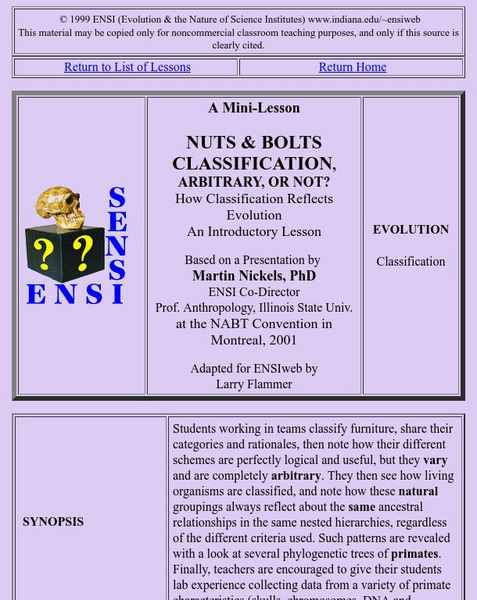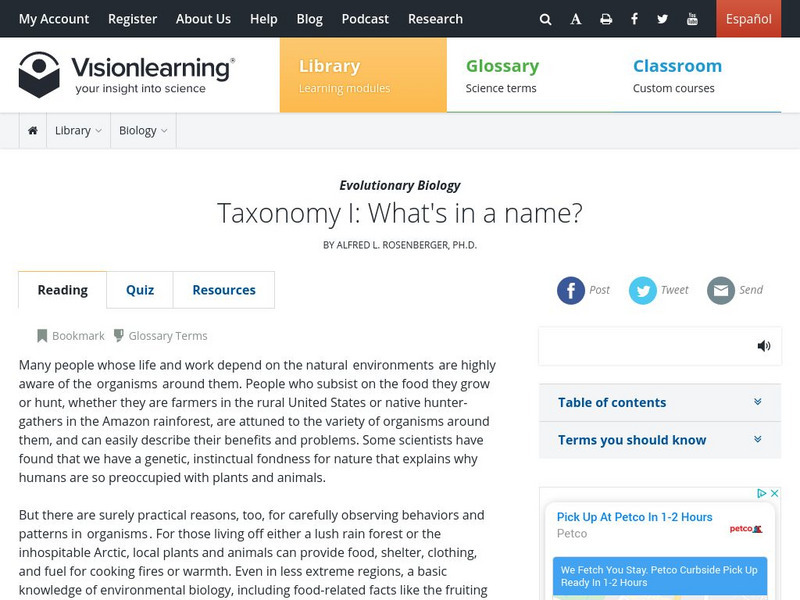Curated OER
Regents High School Examination: Living Environment 2009
Emerging ecologists need a full understanding of life, from the inner workings of a cell to the complex relationships among organisms. This examination is meant to assess high schoolers after an entire year course on the living...
Curated OER
Regents High School Examination: Living Environment 2007
Environmental science enthusiasts show what they know at the end of the year by taking this full-fledged final exam. They answer multiple choice, graph interpretation, and essay analysys questions, 73 of them in all. Topics range from...
Indiana University
Is Classification Arbitrary or Not?
Students transition from classifying furniture to an understanding of classification of living organisms in this thorough lesson plan site.
Vision Learning
Visionlearning: Biology: Taxonomy I: What's in a Name
Instructional module focusing on biological classification. Discussion includes Carolus Linnaeus' taxonomic classification system for organizing and classifying living things. Site also includes an interactive practice quiz and links...
Vision Learning
Visionlearning: Biology: Taxonomy Ii: Ruling Names of Giants
Instructional module focusing on binomial nomenclature. Discussion includes Carolus Linnaeus' taxonomic classification system for naming all species. Site also includes an interactive practice quiz and links relating to the topic.
Science Education Resource Center at Carleton College
Serc: Arthropod Diversity and Evolution an After School Program
This website provides information required for a hands-on program that enables students to work alongside active museum curators, postdoctoral researchers, and collection managers. The programs will teach students to identify, classify,...
Biology 4 kids
Biology4 Kids: Rules of Taxonomy
A short informational piece which provides a clear description of the scientific identification system for all species.
Alabama Learning Exchange
Alex: Animal Classification
In this lesson plan, students will discuss the classification of animals. They will work in groups to research and present classification information about a selected group of animals.
Alabama Learning Exchange
Alex: Botany Scavenger Hunt Where's the Ginkgo?
Young scholars use a science nature journal to log in plants native to Alabama. They sketch pictures of leaves, identify the special characteristics of the plant, and describe the environment where it was found. They also research...
Alabama Learning Exchange
Alex: Classification
This lesson will explain the reasons that society groups and classifies. The lesson has a hands-on component that helps learners connect everyday grouping with the way that scientists group and classify all living organisms.
Alabama Learning Exchange
Alex: Animal, Insect, and Bird Classification
As a follow-up to a unit on the classifications of animals, insects, and birds, students will attend a distance learning field trip. The students will then e-mail trusted adults some of the information learned about the classification of...
The Franklin Institute
The Franklin Institute: Living Things Families
What do centipedes and crabs have in common? What's so special about a backbone? Check this site out from The Franklin Institute if you are interested in biology and classification.














